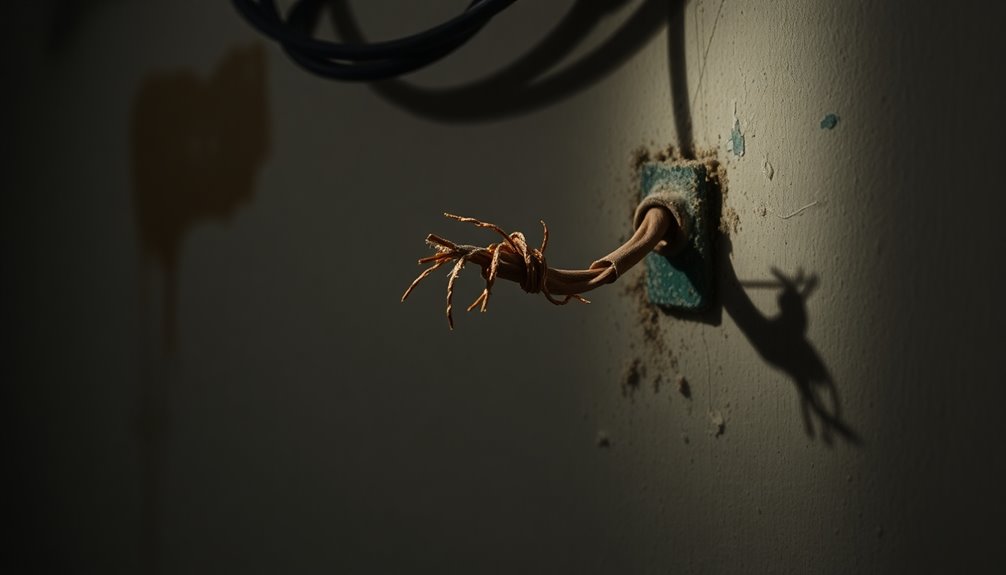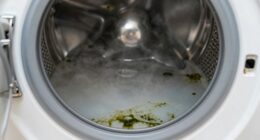Electrical burning smells sharp and acrid, often resembling burning plastic or rubber. This odor typically means there's overheating wiring or damaged insulation. As the situation worsens, the smell might shift to something akin to burning wood. If you notice a metallic scent, it could signal dangerous arcing or sparking. Be vigilant; such odors usually accompany issues like overloaded circuits or faulty appliances. Recognizing these warning signs can prevent serious hazards. Understanding the causes and how to respond can make a difference in your safety. There's much more to explore about how to protect yourself from electrical fires.
Key Takeaways
- Electrical burning smells often resemble burning plastic or rubber, indicating potential overheating wires or faulty components.
- An acrid odor may develop, sometimes with a fishy scent from melting insulation, signaling danger.
- Visual signs include flickering lights, tripped breakers, or charred outlets, indicating electrical issues.
- Metallic scents may suggest electrical arcing, a serious hazard that requires immediate attention.
- Regular inspections and prompt action can significantly reduce the risk of electrical fires and health hazards.
Characteristics of Electrical Burning Smells
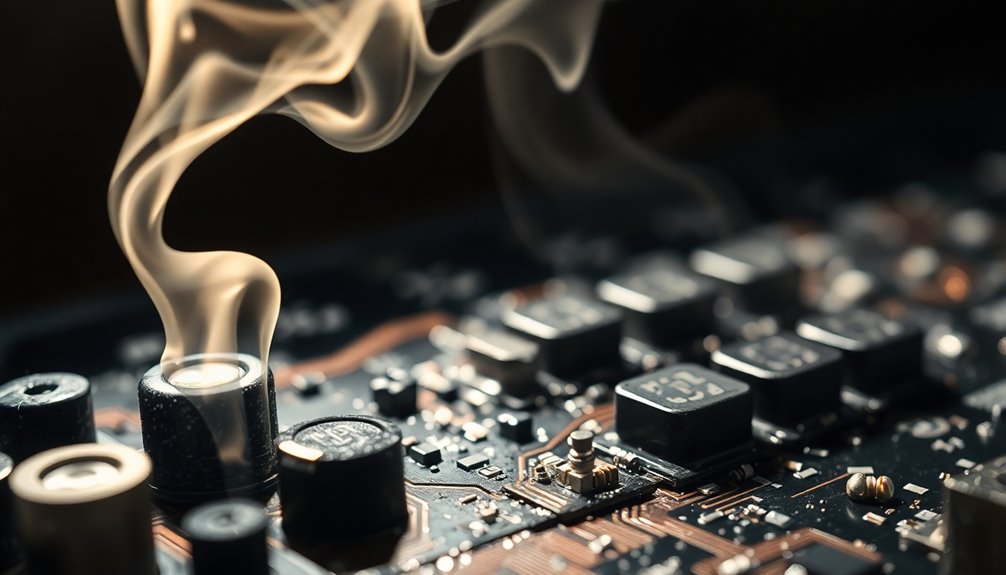
When you encounter an electrical burning smell, it often has distinct characteristics that can help you identify the problem. Typically, it smells like burning plastic or rubber, a result of overheating wires and melting insulation. You might notice a strong, sharp, and acrid odor that can also take on a fishy scent, signaling melting insulation and an increasing fire hazard. If the situation worsens, the smell may evolve to resemble burning wood.
Sometimes, a metallic scent indicates electrical arcing or sparking, which is another sign of trouble. The odor releases harmful compounds like ketones and aldehyde gases from the melting insulation, posing health risks if inhaled. Additionally, the smell can travel through HVAC systems, complicating your efforts to pinpoint the source. Proper grounding is essential to prevent overheating and mitigate the risk of these dangerous odors.
As you notice these odors, you might also experience flickering lights or tripped breakers, pointing to an overload or short circuit. Recognizing these characteristics early is crucial, as they often precede more severe issues, including electrical fires. Always prioritize your safety and act quickly when you detect these warning signs.
Common Sources of Electrical Odors
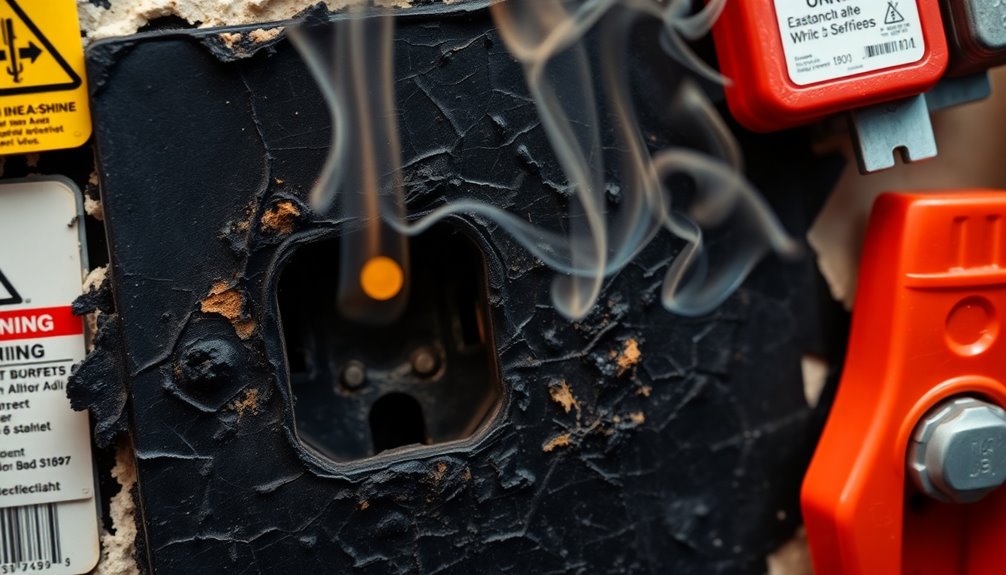
Identifying the common sources of electrical odors is essential for maintaining safety in your home. One major culprit is overloaded circuits. When you plug too many devices into a single circuit, especially in older homes with outdated wiring, you risk overheating wires, which can emit a burning smell. High-power appliances like vacuum cleaners and microwaves can make this problem worse. Regular use of air purifiers can also help improve indoor air quality, reducing the risk of overheating due to dust accumulation. Additionally, ensuring your home has best outdoor survival bags can help prepare you for emergencies caused by electrical failures.
Another source is faulty or damaged wiring. Over time, wear and tear can lead to brittle insulation, exposing wires to potential hazards. Additionally, pests can damage wiring, increasing the risk of electrical issues.
Faulty electrical components and appliances also contribute to burning smells. Defective switches, fuses, or appliances can cause overloads or short circuits, leading to unpleasant odors. Watch out for broken tools, as their internal wiring can also pose risks. Electrical fires estimated at 51,000 annually highlight the importance of being vigilant about these sources.
Environmental factors matter too. Rainwater can rust switches, while rodents may leave behind waste that creates distinctive odors. Even electrical arcing, where electricity jumps between damaged wires, can produce a burning smell. By knowing these sources, you can better protect your home from electrical hazards.
Identification and Detection Methods

Detecting an electrical burning smell quickly is crucial for ensuring safety. You might notice it smells like burning plastic or rubber, often due to melted insulation around copper wires. Sometimes, the odor can even have a fishy quality, indicating the burning of chemicals. If you detect an acrid, chemical smell or something resembling burnt wood, you should act fast, as these are strong, unpleasant indicators of potential danger.
In addition to smell, keep an eye out for visual and auditory cues. Flickering or dimming lights, repeated circuit breaker trips, or charred outlets are all signs of electrical issues that could lead to fire. Large sparks or unusual noises from outlets should raise immediate concern. Regular inspections for warning signs can significantly reduce the risk of electrical fires.
You can also utilize advanced sensing technologies. Odor sensing systems or air-sampling smoke detectors can identify hazardous odors before they become obvious. Thermal imaging can pinpoint overheating components, while sensor arrays can differentiate between various odors, including those related to electrical fires.
Stay vigilant, and if you notice any of these signs, evacuate immediately, shut off the power, and call for emergency help.
Health Risks of Electrical Fires
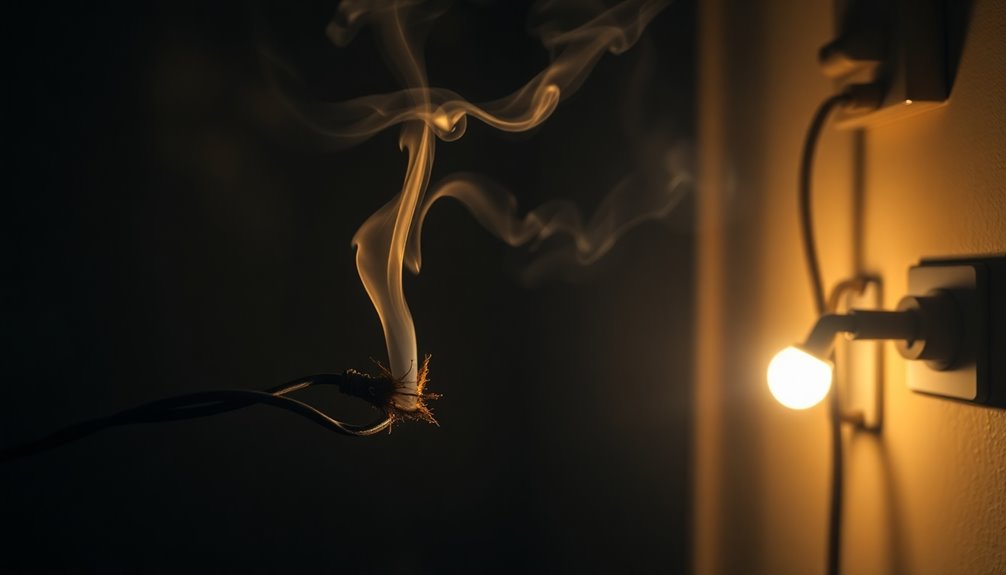
Electrical fires can pose serious health risks, and it's essential to be aware of them. The immediate danger includes electric shock, which can cause burns, muscle contractions, or even cardiac arrest. Touching overheated equipment can result in thermal burns, while arc flashes may lead to severe burns, shrapnel injuries, or even deafness. Inhaling smoke or fumes from electrical fires can trigger respiratory issues, and the chaos of an electrical hazard can lead to falls and secondary injuries.
In addition to immediate effects, physical injuries can be devastating. Electrical currents can damage muscles, nerves, and internal organs, potentially leading to compartment syndrome or the need for amputation in extreme cases. Long-term complications may include eye problems like cataracts, generalized pain, and joint stiffness. You might also face neurological injuries, resulting in symptoms like numbness or even paralysis. Regular inspections of electrical equipment are crucial to preventing hazards and minimizing the risk of such injuries.
Moreover, the psychological impact can be profound. Survivors often experience PTSD, anxiety, or depression, along with memory loss and cognitive difficulties. Seizure disorders and migraines can also emerge as long-lasting effects, underscoring the importance of recognizing and addressing electrical fire hazards promptly.
Preventive Measures and Safety Tips
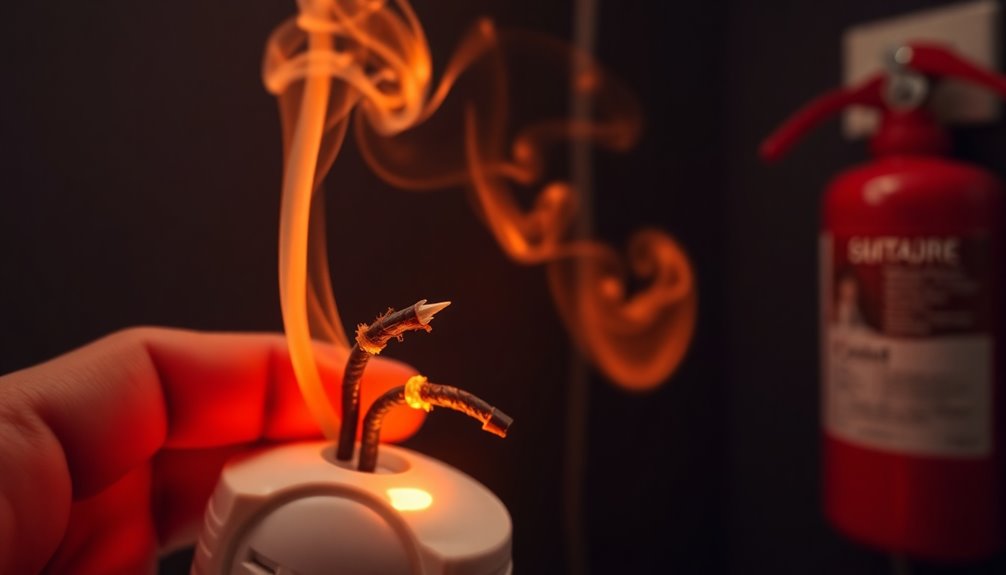
Understanding the health risks associated with electrical fires highlights the importance of taking preventive measures. You should replace damaged cords, frayed wires, or malfunctioning outlets promptly to avoid potential hazards. Regularly inspect your electrical systems and ensure that a qualified electrician handles any maintenance work. In the U.S., approximately 295 deaths occur annually due to electrical fires, emphasizing the need for vigilance and proactive safety measures.
Always check the cords on your appliances, looking for cracks or damage, and replace any faulty ones instead of attempting repairs. Avoid using extension cords with major appliances, as this can lead to overheating. Never overload wall outlets or power strips, and unplug small appliances when they're not in use. Keep electrical cords out from under carpets and furniture to prevent wear and tear.
In case of an emergency, develop and communicate evacuation protocols, ensuring everyone knows the escape routes and meeting points. Install smoke alarms on every level of your property and test them monthly. Equip your home with fire extinguishers specifically designed for electrical fires, and remember not to use water to extinguish electrical flames. By following these safety tips, you greatly reduce the risk of electrical fires and ensure a safer environment for yourself and others.
Frequently Asked Questions
Can Electrical Burning Smells Indicate a Serious Fire Risk?
Yes, electrical burning smells can definitely indicate a serious fire risk. When you notice an acrid odor, it's a sign that wires might be overheating or insulation could be melting. Don't ignore flickering lights or tripped breakers, as these usually point to larger issues. If you smell something unusual, it's crucial to investigate immediately. Taking quick action can help prevent a dangerous situation and keep your home safe from potential electrical fires.
How Can I Differentiate Between Electrical Burning and Other Odors?
To differentiate between electrical burning and other odors, pay attention to distinctive scents. Electrical burning often smells like burning plastic or rubber, while mold or sewer gas won't have these characteristics. A fishy odor is usually a red flag for electrical issues. Cooking smells can also be misleading, but they differ from chemical fumes. If you notice any unfamiliar burning smells, it's best to investigate further and prioritize safety.
What Should I Do if I Smell Electrical Burning?
If you smell electrical burning, act quickly. First, turn off the power at the circuit breaker. Evacuate everyone from the area, especially if the smell is strong or there's smoke. Unplug any appliances you suspect might be causing the odor. Check for flames or smoke, and if you see any, call 911. Secure the area until professionals give the all-clear. Don't use any electrical devices until the issue is resolved.
Are Certain Appliances More Prone to Producing Burning Smells?
Yes, certain appliances are definitely more prone to producing burning smells. High-power devices like vacuum cleaners, blenders, and microwave ovens often overload circuits, leading to overheating. Older appliances with worn-out components or those with rust can also emit these odors. Additionally, if you notice any unusual smells from electrical fixtures, it's wise to check for faulty sockets or damaged wiring. Regular maintenance can help you avoid these issues before they escalate.
How Can I Ensure My Home Is Safe From Electrical Fires?
To ensure your home's safe from electrical fires, regularly inspect your wiring and appliances for damage. Replace any frayed or damaged cords immediately. Avoid overloading outlets and always plug major appliances directly into the wall. Unplug small devices when not in use. Recognize warning signs like flickering lights or acrid smells. If you suspect a problem, evacuate and call 911. Regular inspections by a qualified electrician can also prevent potential hazards.
Conclusion
In conclusion, recognizing the smell of electrical burning is crucial for your safety. If you detect any unusual odors, don't ignore them—act quickly to identify the source and prevent potential disasters. Remember, staying proactive about electrical safety can save lives and property. Regularly check your appliances and wiring, and never hesitate to call a professional if something seems off. Trust your instincts; it's better to be safe than sorry when it comes to electrical hazards!





